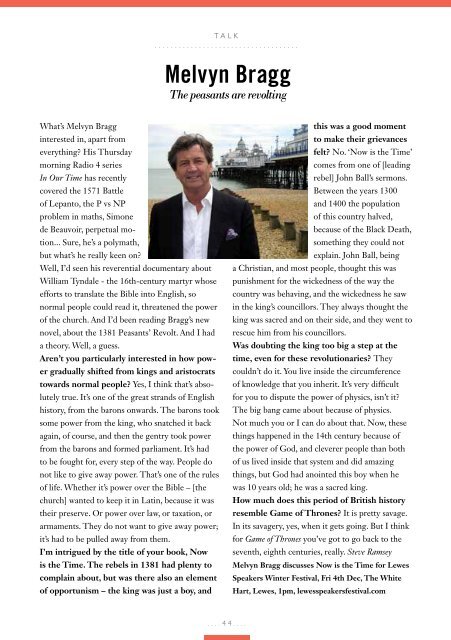You also want an ePaper? Increase the reach of your titles
YUMPU automatically turns print PDFs into web optimized ePapers that Google loves.
talk<br />
....................................<br />
Melvyn Bragg<br />
The peasants are revolting<br />
What’s Melvyn Bragg<br />
interested in, apart from<br />
everything? His Thursday<br />
morning Radio 4 series<br />
In Our Time has recently<br />
covered the 1571 Battle<br />
of Lepanto, the P vs NP<br />
problem in maths, Simone<br />
de Beauvoir, perpetual motion...<br />
Sure, he’s a polymath,<br />
but what’s he really keen on?<br />
Well, I’d seen his reverential documentary about<br />
William Tyndale - the 16th-century martyr whose<br />
efforts to translate the Bible into English, so<br />
normal people could read it, threatened the power<br />
of the church. And I’d been reading Bragg’s new<br />
novel, about the 1381 Peasants’ Revolt. And I had<br />
a theory. Well, a guess.<br />
Aren’t you particularly interested in how power<br />
gradually shifted from kings and aristocrats<br />
towards normal people? Yes, I think that’s absolutely<br />
true. It’s one of the great strands of English<br />
history, from the barons onwards. The barons took<br />
some power from the king, who snatched it back<br />
again, of course, and then the gentry took power<br />
from the barons and formed parliament. It’s had<br />
to be fought for, every step of the way. People do<br />
not like to give away power. That’s one of the rules<br />
of life. Whether it’s power over the Bible – [the<br />
church] wanted to keep it in Latin, because it was<br />
their preserve. Or power over law, or taxation, or<br />
armaments. They do not want to give away power;<br />
it’s had to be pulled away from them.<br />
I’m intrigued by the title of your book, Now<br />
is the Time. The rebels in 1381 had plenty to<br />
complain about, but was there also an element<br />
of opportunism – the king was just a boy, and<br />
this was a good moment<br />
to make their grievances<br />
felt? No. ‘Now is the Time’<br />
comes from one of [leading<br />
rebel] John Ball’s sermons.<br />
Between the years 1300<br />
and 1400 the population<br />
of this country halved,<br />
because of the Black Death,<br />
something they could not<br />
explain. John Ball, being<br />
a Christian, and most people, thought this was<br />
punishment for the wickedness of the way the<br />
country was behaving, and the wickedness he saw<br />
in the king’s councillors. They always thought the<br />
king was sacred and on their side, and they went to<br />
rescue him from his councillors.<br />
Was doubting the king too big a step at the<br />
time, even for these revolutionaries? They<br />
couldn’t do it. You live inside the circumference<br />
of knowledge that you inherit. It’s very difficult<br />
for you to dispute the power of physics, isn’t it?<br />
The big bang came about because of physics.<br />
Not much you or I can do about that. Now, these<br />
things happened in the 14th century because of<br />
the power of God, and cleverer people than both<br />
of us lived inside that system and did amazing<br />
things, but God had anointed this boy when he<br />
was 10 years old; he was a sacred king.<br />
How much does this period of British history<br />
resemble Game of Thrones? It is pretty savage.<br />
In its savagery, yes, when it gets going. But I think<br />
for Game of Thrones you’ve got to go back to the<br />
seventh, eighth centuries, really. Steve Ramsey<br />
Melvyn Bragg discusses Now is the Time for Lewes<br />
Speakers Winter Festival, Fri 4th Dec, The White<br />
Hart, Lewes, 1pm, lewesspeakersfestival.com<br />
....44....


















